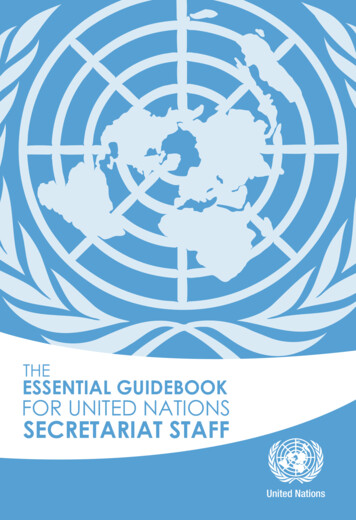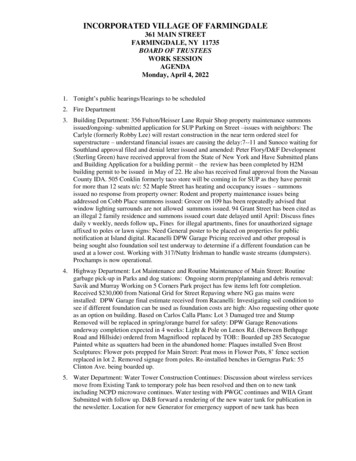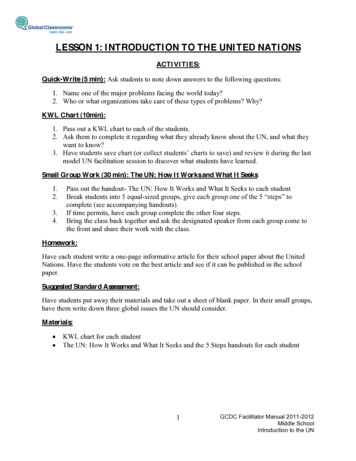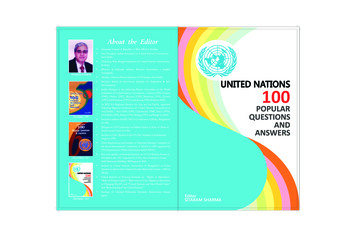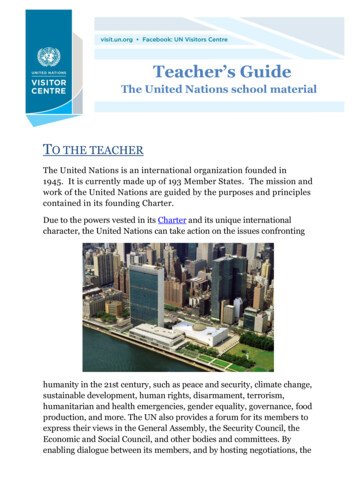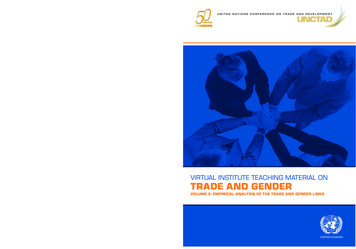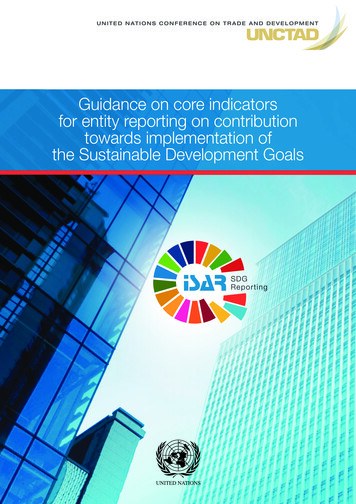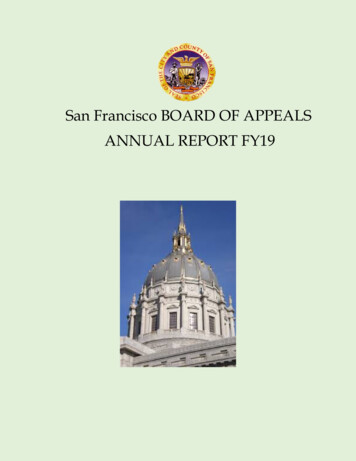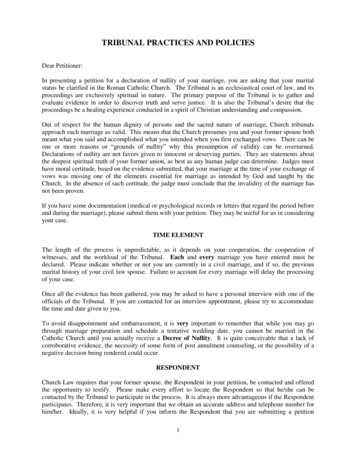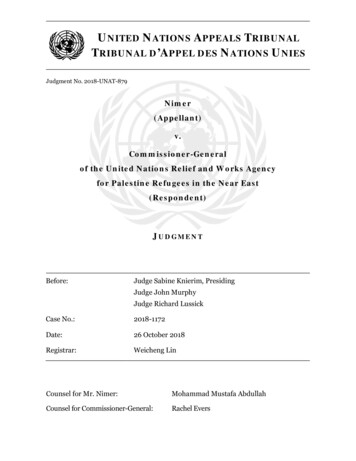
Transcription
UNITED NATIONS APPEALS TRIBUNALTRIBUNAL D’APPEL DES NATIONS UNIESJudgment No. lof the United Nations Relief and Works Agencyfor Palestine Refugees in the Near East(Respondent)J UDGMENTBefore:Judge Sabine Knierim, PresidingJudge John MurphyJudge Richard LussickCase No.:2018-1172Date:26 October 2018Registrar:Weicheng LinCounsel for Mr. Nimer:Mohammad Mustafa AbdullahCounsel for Commissioner-General:Rachel Evers
THE UNITED NATIONS APPEALS TRIBUNALJudgment No. 2018-UNAT-879JUDGE SABINE KNIERIM, PRESIDING.1.The United Nations Appeals Tribunal (Appeals Tribunal) has before it an appealagainst Judgment No. UNRWA/DT/2018/014, rendered by the Dispute Tribunal of theUnited Nations Relief and Works Agency for Palestine Refugees in the Near East (UNRWA DTor UNRWA Dispute Tribunal and UNRWA or Agency, respectively) on 15 February 2018,in the case of Nimer v. Commissioner-General of the United Nations Relief and Works Agencyfor Palestine Refugees in the Near East. Mr. Alaa Eddin Fayez Nimer1 filed the appeal on24 April 2018, and the Commissioner-General filed his answer on 25 June 2018.Facts and Procedure2.On 25 June 2006, Mr. Nimer entered the service of UNRWA as a teacher. At the time ofthe events relevant to the application before the UNRWA DT, Mr. Nimer was a teacher atBeer Saba’a School in Khan Eshieh camp near Damascus, Syria.3.On 1 July 2014, Mr. Nimer’s house was hit by a barrel bomb. Mr. Nimer suffered minorinjuries, but his wife sustained major ones. She spent two months in Al-Muwasat Hospital inDamascus, followed by treatment in private hospitals. Lack of medical resources in Syria totreat the type of injuries suffered by Mr. Nimer’s wife compelled her to seek treatment in Turkey.4.By letter dated 27 November 2016, addressed to the Head, Education Department(H/ED) through the Principal of Beer Saba’a School, Mr. Nimer requested Special Leave WithoutPay (SLWOP) for a year effective 1 December 2016 in order to accompany his wife to Turkey.5.On 13 December 2016, when reviewing the attendance records of its staff inKhan Eshieh camp, the Commissioner-General noted that Mr. Nimer had not reported to dutysince 1 December 2016.6.By letter dated 11 January 2017 to Mr. Nimer, the Officer-in-Charge UNRWA Affairs,Syria Field Office (OiC) reminded Mr. Nimer that he had not reported to duty since1 December 2016, and requested him to report to duty no later than 31 January 2017 and/orprovide an explanation for his absence. The said letter further stated that his failure to do sowould result in his separation from service for abandonment of post.1The Appeals Tribunal has adopted the spelling of his first name used by the UNRWA DT.2 of 14
THE UNITED NATIONS APPEALS TRIBUNALJudgment No. 2018-UNAT-8797.On 31 January 2017, Mr. Nimer received the letter of the OiC through hisSchool Principal.8.On the same day, Mr. Nimer reportedly submitted a request for decision reviewchallenging UNRWA’s “implied administrative decisions” to (1) deny his request for SLWOP;and (2) terminate his employment due to abandonment of post.9.On 5 February 2017, Mr. Nimer sent a letter to the OiC explaining the circumstances ofhis absence.10.On 16 March 2017, Mr. Nimer filed an application with the UNRWA Dispute Tribunalcontesting the Agency’s decisions to (1) deny his request for SLWOP; and (2) terminate hisemployment due to abandonment of post.11.By motion dated 23 August 2017, Mr. Nimer requested leave to amend his request forremedies as his original application before the UNRWA DT had not included a request for moraldamages. His motion was granted by Order No. 114 (UNRWA/DT/2017) dated 30 August 2017.Consequently, Mr. Nimer filed a request “for compensation for the moral damages that hesuffered due to the contested decisions” on 13 September 2017.12.On 24 January 2018, the UNRWA Dispute Tribunal issued a notice of hearing convokingthe parties to a hearing on 7 February 2018. By e-mail dated 25 January 2018, Mr. Nimer’srepresentative, Mr. Abdullah, requested the UNRWA Dispute Tribunal to move the date ofthe hearing. On 25 January 2018, the UNRWA Dispute Tribunal issued an amended notice ofhearing moving the date of the hearing to 8 February 2018. Mr. Nimer and his representativeconfirmed their intent to be in attendance at the hearing. The Commissioner-General confirmedhis participation by video-link as did the witnesses.13.On 5 February 2018, Mr. Nimer’s representative filed a motion requesting theUNRWA Dispute Tribunal to facilitate his presence at the aryUNRWA Dispute Tribunal denied the motion, holding, inter alia, as follows:22Order No. 020 (UNRWA/DT/2018), paras. 18-20.3 of 142018,the
THE UNITED NATIONS APPEALS TRIBUNALJudgment No. 2018-UNAT-879.As it is clear from Article 8 (2) [of the UNRWA DT Rules of Procedure] that theAgency’s framework specifically provides that a party may be represented by astaff member, it is unquestionable that the Agency has to allow the representative toattend the hearing as any other representative would, either in person, by telephone orvia video-link.However, it is not for the [UNRWA Dispute] Tribunal to dictate the conditionsunder which a staff member will be released from his normal post duties for the purposeof representing a party in a case before the [UNRWA Dispute] Tribunal. Thestaff representative is voluntarily representing [Mr. Nimer], and it is certain that his tasksin representing [Mr. Nimer] are not related to his post duties as a teacher.Just as the [UNRWA Dispute] Tribunal cannot order the Agency to pay for anylegal or other representation for an Applicant, it cannot, in this case, order the Agency tocompensate the staff representative for performing tasks during normal workinghours that are unrelated to his post duties. However, in the interests of justice, the[UNRWA Dispute] Tribunal is hopeful that the Agency and staff representative will find aworkable solution in order to allow the staff representative to attend the hearing either inperson, by telephone or via video-link.15.A hearing was held on 8 February 2018. Two hours before the hearing, Mr. Nimer andhis representative informed the UNRWA Dispute Tribunal that they would not attend thehearing. In his communication, Mr. Nimer’s representative stated that he had been denied theapproval to leave his duty station during working hours to attend the hearing. He also referred toprevious occasions where the Agency had granted approval for him to leave his duty station toattend mediation sessions in cases in which he was representing other applicants. He added thatunder these circumstances, i.e. his absence from the hearing, he would advise Mr. Nimeragainst participating in the hearing via telephone from Turkey. Mr. Nimer indeed informedthe UNRWA DT by e-mail that he would not participate in the hearing via telephone. TheUNRWA Dispute Tribunal heard by video-link the testimony of the School Principal andimmediate supervisor of Mr. Nimer, and the testimony of the H/ED.16.The UNRWA DT rendered its Judgment on 15 February 2018, dismissing the applicationin its entirety. Regarding Mr. Nimer’s representative’s alleged inability to attend the oral hearing,the UNRWA DT found no procedural violation. In particular, the UNRWA DT considered basedon the evidence submitted by the Commissioner-General after the hearing that Mr. Nimer’srepresentative had failed to request leave from the Agency to attend the hearing, had madeno attempt to utilise any other means such as telephone or video-link to participate in it and hadnot filed any motion with the UNRWA DT requesting an additional change of the hearing date.4 of 14
THE UNITED NATIONS APPEALS TRIBUNALJudgment No. 2018-UNAT-87917.On the issue of SLWOP, the UNRWA DT considered that the application was notreceivable ratione materiae as no administrative decision had been taken by the Agency withregard to Mr. Nimer’s request for SLWOP. The UNRWA DT found that the written request forSLWOP Mr. Nimer had sent on 27 November 2016 via the School Principal did not respect therequired one-month notice period before his intended leave date, and he had ceased to reportfor duty three days later, on 1 December 2016. However, as the request sent by pouch bythe School Principal never reached the responsible Area Education Office or the H/ED and asMr. Nimer never reported in order to sign the proper forms for SLWOP, the Agency has notdecided on his request.18.On the issue of termination, the UNRWA DT dismissed the application on the merits. Itconsidered that the Agency’s decision to terminate Mr. Nimer’s employment by reason ofabandonment of post was made in accordance with the applicable Regulations and Rulesand other administrative issuances. In particular, Mr. Nimer had failed to comply with hisobligations as a staff member, when he absented himself from work from 1 December 2016until the date of his termination on 31 January 2017 and had failed to provide an explanation forhis unauthorised absence by the deadline of 31 January 2017 as contained in the OiC’s letterdated 11 January 2017.19.Not having found any illegality in the Agency’s decisions, the UNRWA DT declined togrant any of the relief sought by Mr. Nimer.SubmissionsMr. Nimer’s Appeal20.Mr. Nimer contends that the UNRWA DT erred in procedure and violated his right toequal treatment and proper legal representation by preventing his representative fromparticipating in the oral hearing. When the UNRWA DT issued a notice of hearing orderingMr. Nimer’s representative to appear in person on 7 February 2018 which was the first day ofschool, it willingly or negligently disregarded the reality of the representative’s employmentsituation as a teacher working for the Agency.In response to Mr. Nimer’s motion, theUNRWA DT merely rescheduled the hearing for the following day but did not change the locationor time of the hearing. Rather than expressing its hope that the Agency and staff representativefind a workable solution, the UNRWA DT should have settled the matter with a clear order5 of 14
THE UNITED NATIONS APPEALS TRIBUNALJudgment No. 2018-UNAT-879under Article 14 of its Rules of Procedure, stating that the representative should be allowed toparticipate in the oral hearing.21.Mr. Nimer further argues that the UNRWA DT committed errors of fact. In particular, itincorrectly stated that his request for SLWOP had not been filed in a timely fashion whereas infact, he had submitted it in accordance with the chain of command and the life-threateningcircumstances in Syria made it impossible for him to deliver it personally to the H/ED or to sendhis father on the dangerous way to Damascus City. The UNRWA DT erred in accepting theH/ED’s testimony when it contradicted that of the School Principal. Had the H/ED indeedreceived an e-mail or a phone call from the School Principal stating that Mr. Nimer had requestedSLWOP, then Mr. Nimer would have received an immediate response that his request wasformally incorrect while he was waiting to leave for Turkey for three days after submitting hisleave request.22.The UNRWA DT failed to note the exceptional circumstances that Mr. Nimerexperienced when he was waiting for human traffickers to transport him to Turkey and wasunable to communicate at that time.23.The UNRWA DT erred when it found that, upon receiving the 11 January 2017 letter,Mr. Nimer waited until 5 February 2017 to respond. He had already provided the requiredexplanation for his absence before he received the 11 January 2017 letter on 31 January 2017 bysubmitting a request for decision review on 29 January 2017.The Commissioner-Generalhimself states and concedes that Mr. Nimer submitted a review request on 29 January 2017.Moreover, the 11 January 2017 letter afforded a 21-day time limit to respond which has toreasonably be interpreted as starting from the date of the effective receipt of the letter. Havingreceived the letter on 31 January 2017, he could not be blamed for replying only five calendardays later on 5 February 2017.24.With respect to the decision to deem him to have abandoned his post, Mr. Nimer submitsthat the UNRWA DT erred in procedure when it failed to require the Commissioner-General torespond to his challenge of the decision. In addition, the UNRWA DT exceeded its substantivejurisdiction by putting itself in the place of the Agency by considering that the decision to deemMr. Nimer to have abandoned his post was lawful. The UNRWA DT ought to have held backbefore tarnishing him as being neglectful and irresponsible. In particular, it disregarded the factthat his record of service was plainly unimpeachable, his performance had been rated as6 of 14
THE UNITED NATIONS APPEALS TRIBUNALJudgment No. 2018-UNAT-879outstanding for years and he had not been absent a single day throughout his years of serviceup until 1 December 2016. The UNRWA DT also erred in failing to take into consideration hisexceptional circumstances and force majeure.25.Based on the foregoing, Mr. Nimer requests that the Appeals Tribunal vacate theUNRWA DT Judgment and remand the case for a de novo hearing before a different Judge. Hefurther asks to be granted the relief he had requested before the UNRWA DT, namely one year ofSLWOP from 1 December 2016 to 1 December 2017, rescission of the decision to separate him forabandonment of post and moral damages.The Commissioner-General’s Answer26.The Commissioner-General submits that Mr. Nimer has not established any errorswarranting a reversal of the UNRWA DT Judgment or a remand of the case to the UNRWA DTfor a de novo hearing.27.Mr. Nimer has not demonstrated how the alleged procedural error resulting from hisrepresentative’s non-participation in the oral hearing affected the decision of the case inparticular as the evidence underlying the impugned decisions as such remains unassailed. TheUNRWA DT was cognizant of the wide margin of discretion in matters of case management andindeed issued an amended notice moving the date of the hearing at Mr. Nimer’s request.Moreover, the representative’s non-attendance was solely at his own volition and cannot beattributed to the UNRWA DT since he had notified the UNRWA DT that he would not beattending the hearing due to having been denied permission to leave his duty station while onthe same day seeking urgent leave from his work in order to go to the Central Court Complexin Amman.28.Further, the UNRWA DT did not commit an error in procedure by failing to requestthe Commissioner-General to submit a substantive reply on the issue of termination forabandonment of post, nor did it exceed its jurisdiction by considering the matter without hissubmissions. The UNRWA DT was cognizant of its wide margin of discretion in matters of casemanagement and correctly considered the issue by relying on the relevant legal framework,reviewing the evidence on the record and concluding that the termination decision was lawful.7 of 14
THE UNITED NATIONS APPEALS TRIBUNALJudgment No. 2018-UNAT-87929.The Commissioner-General further asserts that while Mr. Nimer has identified allegederrors or fact, he has not demonstrated that the findings of fact were not supported by evidenceor that they were unreasonable as required by the established Appeals Tribunal jurisprudence.The contested finding that Mr. Nimer’s request for SLWOP had not been received by the H/EDwas based on the H/ED’s testimony and thus sufficiently supported by evidence. Regarding thesecond alleged error of fact, the Commissioner-General submits that the issue of whetherMr. Nimer submitted a timely decision review request did not form part of the impugnedJudgment and is therefore irrelevant for purposes of the appeal.30.The Commissioner-General further submits that the UNRWA DT did not err as a matterof law when it dismissed the application on the merits. The UNRWA DT referenced the relevantlegal framework, reviewed the evidence and correctly concluded that no administrative decisionhad been taken on Mr. Nimer’s SLWOP request and that the decision to terminate hisemployment for abandonment of post was lawful.31.Consequently, the relief sought by Mr. Nimer has no legal basis. In light of the foregoing,the Commissioner-General requests that the Appeals Tribunal dismiss the appeal in its entirety.ConsiderationsRequest for an oral hearing32.Mr. Nimer’s request is denied. Under Article 8(3) of the Statute of the Appeals Tribunaland Article 18(1) of the Appeals Tribunal Rules of Procedure, oral hearings may be heldwhere they would “assist in the expeditious and fair disposal of the case”. In light of theavailability of the recording of the oral hearing before the UNRWA DT, there is no need for,or added value to, further clarification, and the factual and legal issues arising from thisappeal have been clearly defined by the parties. We note, further, that Mr. Nimer and/or hisrepresentative could have participated in the oral hearing held before the UNRWA DT.3It is only before the Dispute Tribunal as the court of first instance that oral hearings form acommon part of the proceedings while the Appeals Tribunal will only hold hearings under veryexceptional circumstances.3See also further below, para. 33.8 of 14
THE UNITED NATIONS APPEALS TRIBUNALJudgment No. 2018-UNAT-879Mr. Nimer’s representation33.The UNRWA DT did not commit an error of procedure such as to affect the decision ofthe case by failing to order the Agency to allow the participation of Mr. Nimer’s representative inthe oral hearing or by failing to accommodate the latter’s employment situation. While astaff member has a right to be represented by another staff member pursuant to Article 8(2) ofthe UNRWA DT Rules of Procedure, the UNRWA DT has wide discretion in matters of casemanagement.4 In this case, Mr. Nimer’s representative did not submit an additional motionrequesting another change of the hearing date, made no attempt to participate via telephone,video-link etc. and failed to request leave from work in order to attend the oral hearing before theUNRWA DT. On the contrary, the documentary evidence shows that Mr. Nimer’s representativerequested and was granted leave on the very day of the oral hearing to pursue some otherprivate business. It was thus within the UNRWA DT’s discretion to encourage an amicablesolution rather than to order the Agency to give his representative permission to absent himselffrom work in order to attend the hearing. We note, further, that even if there was a proceduralerror Mr. Nimer would need to show that this error affected the decision of the case,5 which, inthe present case, he has not done.SLWOP34.The UNRWA DT did not err on a question of fact, resulting in a manifestly unreasonabledecision when it determined that the H/ED had not received Mr. Nimer’s request for SLWOPand, consequently, that there had not been an administrative decision with regard to this request.35.The UNRWA DT did not err in relying on the testimony of the H/ED when it found thatshe had not received a request for SLWOP by Mr. Nimer. The H/ED testified that she “did notreceive any written letter from [Mr. Nimer]” but “a letter signed and stamped by the schoolprincipal”. Like the UNRWA DT, we are not convinced that the H/ED indeed did receive the27 November 2016 letter which contained a request for SLWOP by Mr. Nimer and was alsostamped and signed by the School Principal.Article 14 of the UNRWA DT Rules of Procedure; Mohanna v. Commissioner-General of theUnited Nations Relief and Works Agency for Palestine Refugees in the Near East, JudgmentNo. 2016-UNAT-687, para. 20.5 Article 2(1)(d) of the Appeals Tribunal Statute; Nadeau v. Secretary-General of the United Nations,Judgment No. 2017-UNAT-733, para. 31.49 of 14
THE UNITED NATIONS APPEALS TRIBUNALJudgment No. 2018-UNAT-87936.Even if the UNRWA DT, by relying on the testimony of the School Principal who statedthat in late November 2016 he had sent Mr. Nimer’s written request for SLWOP to the H/ED, theUNRWA DT had committed an error of fact, this would not have resulted in a manifestlyunreasonable decision as the UNRWA DT’s conclusion that no administrative decision had beentaken on the issue of SLWOP is still correct. Both witnesses testified to this effect. The H/ED, inher testimony, pointed out that for a request for SLWOP, certain rules and procedures had to befollowed, and that she had called the School Principal and told him that Mr. Nimer “had to comeand sign these forms or to send someone authorised in order to do that”. The School Principalconfirmed that the H/ED had called and told him that Mr. Nimer had “to report to theeducation department and sign the relevant forms”. The School Principal expressly deniedMr. Nimer’s submission in his application to the UNRWA DT that the School Principal hadinformed him on 8 December 2016 of the Agency’s decision to deny SLWOP. In his testimony,the School Principal made it clear that he “only reported [the matter] to [Mr. Nimer’s] father” and“told him that Alaa [(Mr. Nimer)] had to attend and to appear before the area ( ) educationoffice department, in order to sign the forms or to send someone authorised to do that onhis behalf”.37.It becomes clear from these testimonies that the 27 November 2016 letter, whether or notit was received by the H/ED, did not fulfill the requirements for a request for SLWOP and hencedid not enable the Agency to take a decision on this matter. Apart from not having used andsigned special forms, Mr. Nimer’s request for SLWOP was defective in that it did not contain anysubstantial explanation as to the reasons why SLWOP should be granted. The relevant UNRWAprovision on the procedure for requesting SLWOP reads as follows: “Applications for specialleave must be accompanied by a written explanation of the circumstances giving rise to therequest and, where necessary, must be supported by documentary evidence.” 638.The 27 November 2016 letter does not contain the required written explanation of thecircumstances giving rise to the request for SLWOP. Mr. Nimer only stated that he had “to travelabroad for the medical treatment of (his) wife”. Neither did he give any information about themedical situation of his wife nor did he state why it was necessary for him to go abroad and wherehe was going.6Section 3.2 of UNRWA Personnel Directive No. A/5/Rev.7, Part II (Special Leave).10 of 14
THE UNITED NATIONS APPEALS TRIBUNALJudgment No. 2018-UNAT-879Separation from service39.UNRWA’s regulatory framework reads as follows:UNRWA Area Staff Rule 109.4 on abandonment of posts (as of 1 May 2015)1.Where a staff member voluntarily absents himself/herself from duty and suchabsence neither has been authorised nor is subsequently authorised in accordance withthese rules, then such staff member may be separated from Agency service by reason ofabandonment of post as provided hereunder.2.Where a staff member has absented himself/herself in the manner described inparagraph 1 above for three or more consecutive working days, the Commissioner-Generalmay send to such staff member a letter informing him/her that unless, by a specified date(determined at the Commissioner-General's discretion), he/she reports for duty orsubmits a written explanation of his/her absence which is acceptable to theCommissioner-General, he/she shall be deemed to have been separated from Agencyservice by reason of abandonment of post under the provisions of this rule.3.In accordance with the provisions of paragraph 2 above, a staff member whofails to report for duty or to submit an acceptable written explanation by the datespecified in the letter, shall unless for exceptional reasons the Commissioner-Generaldecides otherwise, be separated from Agency service under this rule, with effect from2400 hours (local time) on the day immediately preceding the first day of his/herunauthorized absence.40.The OiC UNRWA Affairs informed Mr. Nimer by letter dated 11 January 2017 that unlesshe returned to duty no later than 31 January 2017 and/or submitted a written explanation ofhis absence acceptable to the Agency, he would be separated from the Agency’s services ongrounds of abandonment of post. The UNRWA DT committed an error of law and fact, resultingin a manifestly unreasonable decision, in stating that Mr. Nimer had failed to provide bythe deadline of 31 January 2017, an explanation to UNRWA about his unauthorised absence. Wefind that Mr. Nimer rendered such a written explanation in his 29 January 2017 request fordecision review.41.The 29 January 2017 request for decision review can be regarded as a written explanationwithin the meaning of UNRWA Area Staff Rule 109.4(2) and (3) and as required by the11 January 2017 letter since, in this document, Mr. Nimer explained why he left his post and whyhe should not have been separated from service for abandonment of post. Although Mr. Nimerhad not received the 11 January 2017 letter when he wrote the 29 January 2017 document, andused the form for “Request for Decision Review”, it would be too formalistic not to accept the11 of 14
THE UNITED NATIONS APPEALS TRIBUNALJudgment No. 2018-UNAT-87929 January 2017 letter as a written explanation under UNRWA Area Staff Rule 109.4(2) and (3)and in response to the 11 January 2017 letter. As long as the staff member, within the time limitspecified, submits a written explanation of his or her absence to the Agency, the onus is on theAgency to lay its eyes on it and decide whether the explanation is acceptable or not.42.The 29 January 2017 request for decision review was submitted before or on31 January 2017 and hence within the time limit specified in the 11 January 2017 letter. In hisappeal, Mr. Nimer stated that he submitted his review request before 31 January 2017, and,among others, to the very person who issued the 11 January letter, that is the OiC. TheCommissioner-General did not question this submission in his answer to the appeal but merelyclarified “that the issue whether the Appellant submitted a timely decision review request didnot form part of the impugned judgment and is therefore irrelevant for purposes of the instantappeal”. At no time has the Commissioner-General alleged that the Agency did not receiveMr. Nimer’s decision review request on or before 31 January 2017. Mr. Nimer’s submission isstrongly supported by his 5 February 2017 letter to the OiC where he submits that on31 January 2017, he filed a request for decision review to the Deputy Commissioner-General,contesting the decision not to approve his leave request as well as the decision to separate himfrom service on grounds of abandonment of post, and, at the same time, sent this request bye-mail to the OiC. The Respondent, in his reply to Mr. Nimer’s application, had stated that “on29 January 2016 [(correct: 2017)] the Applicant submitted a request for decision review statingthat the Agency had denied his request for SLWOP”.43.Under the circumstances, the Agency’s decision to separate Mr. Nimer from servicefor abandonment of post is not reasonable and thus unlawful.The Agency, after havingreceived Mr. Nimer’s 29 January 2017 request for decision review, should have examinedwhether the request provided an acceptable explanation for his absence. Therefore, we orderrescission of this decision, and, as it concerns termination, set an amount of compensationthat the Commissioner-General may elect as an alternative to the rescission of the contestedadministrative decision pursuant to Article 9(1)(a) of the Appeals Tribunal Statute.Award of compensation for moral harm44.By dismissing his application in its entirety, the UNRWA DT (implicitly) dismissedMr. Nimer’s application for compensation for moral harm. There was no need for theUNRWA DT to provide any further reasoning for this decision because it directly followed12 of 14
THE UNITED NATIONS APPEALS TRIBUNALJudgment No. 2018-UNAT-879from its finding of lawfulness of the contested administrative decision and its dismissal ofMr. Nimer’s application. As we have stated before, “compensation cannot be awarded whenno illegality has been established; it cannot be granted when there is no breach of thestaff member’s rights or administrative wrongdoing in need of repair”.745.However, having overturned the UNRWA DT’s finding that the decision to separateMr. Nimer from service was lawful, we must now decide whether Mr. Nimer is entitledto compensation.46.In this regard, Article 9(1)(b) of the Statute of the Appeals Tribunal provides:1.The Appeals Tribunal may only order one or both of the following:( )(b)Compensation for harm, supported by evidence, which shall normallynot exceed the equivalent of two years’ net base salary of the applicant. TheAppeals Tribunal may, however, in exceptional cases order the payment of a highercompensation for harm, supported by evidence, and shall provide the reasons forthat decision.47.The Appeals Tribunal may only award compensation for harm in cases where thestaff member has presented evidence other than his own testimony that he or she sufferedmoral injury due to the contested administrative decision.8 Mr. Nimer did not present anyevidence showing that he suffered mental distress, anxiety or other moral injury.Consequently, there can be no award of compensation in this respect.Kawamleh v. Commissioner-General of the United Nations Relief and Works Agency forPalestine Refugees in the Near East, Judgment No, 2018-UNAT-818, citing Kucherov v.Secretary-General of the United Nations, Judgment No. 2016-UNAT-669, para. 33, in turn citingWishah v. Commissioner-General of the United Nations Relief and Works Agency forPalestine Refugees in the Near East, Judgment No. 2015-UNAT-537, para. 40, and citations therein.8 Langue v. Secretary-General of the United Nations, Judgment No. 2018-UNAT-858, paras. 17-20,citing Kallon v. Secretary-General of the United Nations, Judgment No. 2017-UNAT-742, ConcurringOpinion of
THE UNITED NATIONS APPEALS TRIBUNAL Judgment No. 2018-UNAT-879 3 of 14 7. On 31 January 2017, Mr. Nimer received the letter of the OiC through his School Principal. 8. On the same day, Mr. Nimer .
